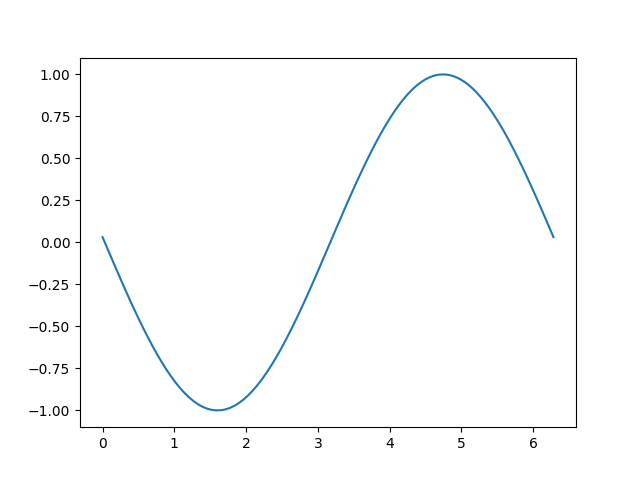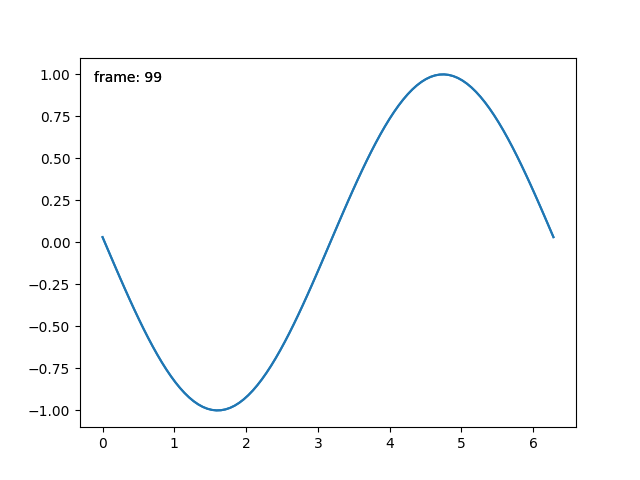Matplotlib Imshow Update Figure Continuous Video
Note
Click here to download the full example code
Faster rendering by using blitting#
Blitting is a standard technique in raster graphics that, in the context of Matplotlib, can be used to (drastically) improve performance of interactive figures. For example, the animation and widgets modules use blitting internally. Here, we demonstrate how to implement your own blitting, outside of these classes.
Blitting speeds up repetitive drawing by rendering all non-changing graphic elements into a background image once. Then, for every draw, only the changing elements need to be drawn onto this background. For example, if the limits of an Axes have not changed, we can render the empty Axes including all ticks and labels once, and only draw the changing data later.
The strategy is
-
Prepare the constant background:
-
Draw the figure, but exclude all artists that you want to animate by marking them as animated (see
Artist.set_animated). -
Save a copy of the RBGA buffer.
-
-
Render the individual images:
-
Restore the copy of the RGBA buffer.
-
Redraw the animated artists using
Axes.draw_artist/Figure.draw_artist. -
Show the resulting image on the screen.
-
One consequence of this procedure is that your animated artists are always drawn on top of the static artists.
Not all backends support blitting. You can check if a given canvas does via the FigureCanvasBase.supports_blit property.
Warning
This code does not work with the OSX backend (but does work with other GUI backends on mac).
Minimal example#
We can use the FigureCanvasAgg methods copy_from_bbox and restore_region in conjunction with setting animated=True on our artist to implement a minimal example that uses blitting to accelerate rendering
import matplotlib.pyplot as plt import numpy as np x = np . linspace ( 0 , 2 * np . pi , 100 ) fig , ax = plt . subplots () # animated=True tells matplotlib to only draw the artist when we # explicitly request it ( ln ,) = ax . plot ( x , np . sin ( x ), animated = True ) # make sure the window is raised, but the script keeps going plt . show ( block = False ) # stop to admire our empty window axes and ensure it is rendered at # least once. # # We need to fully draw the figure at its final size on the screen # before we continue on so that : # a) we have the correctly sized and drawn background to grab # b) we have a cached renderer so that ``ax.draw_artist`` works # so we spin the event loop to let the backend process any pending operations plt . pause ( 0.1 ) # get copy of entire figure (everything inside fig.bbox) sans animated artist bg = fig . canvas . copy_from_bbox ( fig . bbox ) # draw the animated artist, this uses a cached renderer ax . draw_artist ( ln ) # show the result to the screen, this pushes the updated RGBA buffer from the # renderer to the GUI framework so you can see it fig . canvas . blit ( fig . bbox ) for j in range ( 100 ): # reset the background back in the canvas state, screen unchanged fig . canvas . restore_region ( bg ) # update the artist, neither the canvas state nor the screen have changed ln . set_ydata ( np . sin ( x + ( j / 100 ) * np . pi )) # re-render the artist, updating the canvas state, but not the screen ax . draw_artist ( ln ) # copy the image to the GUI state, but screen might not be changed yet fig . canvas . blit ( fig . bbox ) # flush any pending GUI events, re-painting the screen if needed fig . canvas . flush_events () # you can put a pause in if you want to slow things down # plt.pause(.1) 
This example works and shows a simple animation, however because we are only grabbing the background once, if the size of the figure in pixels changes (due to either the size or dpi of the figure changing) , the background will be invalid and result in incorrect (but sometimes cool looking!) images. There is also a global variable and a fair amount of boiler plate which suggests we should wrap this in a class.
Class-based example#
We can use a class to encapsulate the boilerplate logic and state of restoring the background, drawing the artists, and then blitting the result to the screen. Additionally, we can use the 'draw_event' callback to capture a new background whenever a full re-draw happens to handle resizes correctly.
class BlitManager : def __init__ ( self , canvas , animated_artists = ()): """ Parameters ---------- canvas : FigureCanvasAgg The canvas to work with, this only works for sub-classes of the Agg canvas which have the `~FigureCanvasAgg.copy_from_bbox` and `~FigureCanvasAgg.restore_region` methods. animated_artists : Iterable[Artist] List of the artists to manage """ self . canvas = canvas self . _bg = None self . _artists = [] for a in animated_artists : self . add_artist ( a ) # grab the background on every draw self . cid = canvas . mpl_connect ( "draw_event" , self . on_draw ) def on_draw ( self , event ): """Callback to register with 'draw_event'.""" cv = self . canvas if event is not None : if event . canvas != cv : raise RuntimeError self . _bg = cv . copy_from_bbox ( cv . figure . bbox ) self . _draw_animated () def add_artist ( self , art ): """ Add an artist to be managed. Parameters ---------- art : Artist The artist to be added. Will be set to 'animated' (just to be safe). *art* must be in the figure associated with the canvas this class is managing. """ if art . figure != self . canvas . figure : raise RuntimeError art . set_animated ( True ) self . _artists . append ( art ) def _draw_animated ( self ): """Draw all of the animated artists.""" fig = self . canvas . figure for a in self . _artists : fig . draw_artist ( a ) def update ( self ): """Update the screen with animated artists.""" cv = self . canvas fig = cv . figure # paranoia in case we missed the draw event, if self . _bg is None : self . on_draw ( None ) else : # restore the background cv . restore_region ( self . _bg ) # draw all of the animated artists self . _draw_animated () # update the GUI state cv . blit ( fig . bbox ) # let the GUI event loop process anything it has to do cv . flush_events () Here is how we would use our class. This is a slightly more complicated example than the first case as we add a text frame counter as well.
# make a new figure fig , ax = plt . subplots () # add a line ( ln ,) = ax . plot ( x , np . sin ( x ), animated = True ) # add a frame number fr_number = ax . annotate ( "0" , ( 0 , 1 ), xycoords = "axes fraction" , xytext = ( 10 , - 10 ), textcoords = "offset points" , ha = "left" , va = "top" , animated = True , ) bm = BlitManager ( fig . canvas , [ ln , fr_number ]) # make sure our window is on the screen and drawn plt . show ( block = False ) plt . pause ( .1 ) for j in range ( 100 ): # update the artists ln . set_ydata ( np . sin ( x + ( j / 100 ) * np . pi )) fr_number . set_text ( "frame: {j} " . format ( j = j )) # tell the blitting manager to do its thing bm . update () 
This class does not depend on pyplot and is suitable to embed into larger GUI application.
Total running time of the script: ( 0 minutes 1.185 seconds)
Gallery generated by Sphinx-Gallery
Source: https://matplotlib.org/stable/tutorials/advanced/blitting.html
Post a Comment for "Matplotlib Imshow Update Figure Continuous Video"